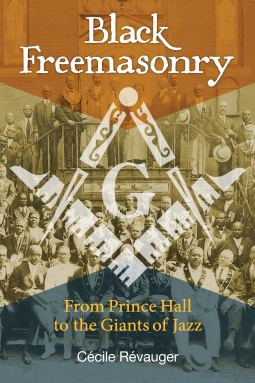
Black Freemasonry
From Prince Hall to the Giants of Jazz
by Cécile Révauger
This title was previously available on NetGalley and is now archived.
Buy on Amazon
Buy on BN.com
Buy on Bookshop.org
*This page contains affiliate links, so we may earn a small commission when you make a purchase through links on our site at no additional cost to you.
Send NetGalley books directly to your Kindle or Kindle app
1
To read on a Kindle or Kindle app, please add kindle@netgalley.com as an approved email address to receive files in your Amazon account. Click here for step-by-step instructions.
2
Also find your Kindle email address within your Amazon account, and enter it here.
Pub Date Jan 02 2016 | Archive Date Dec 15 2015
Description
The history of black Freemasonry from Boston and Philadelphia in the late 1700s through the Civil War to the Civil Rights Movement
• Examines the letters of Prince Hall, legendary founder of the first black lodge
• Reveals how many of the most influential jazz musicians of the 20th century were also Masons, including Louis Armstrong, Duke Ellington, and Nat King Cole
• Explores the origins of the Civil Rights Movement within black Freemasonry and the roles played by Booker T. Washington and W. E. B. Du Bois
When the first Masonic lodges opened in Paris in the early 18th century their membership included traders, merchants, musketeers, clergymen, and women--both white and black. This was not the case in the United States where black Freemasons were not eligible for membership in existing lodges. For this reason the first official charter for an exclusively black lodge--the Prince Hall Grand Lodge of Massachusetts--was granted by the Grand Lodge of England rather than any American chapter.
Through privileged access to archives kept by Grand Lodges, Masonic libraries, and museums in both the United States and Europe, respected Freemasonry historian Cécile Révauger traces the history of black Freemasonry from Boston and Philadelphia in the late 1700s through the Abolition Movement and the Civil War to the genesis of the Civil Rights Movement in the early 1900s up through the 1960s. She opens with a look at Prince Hall, legendary founder and the chosen namesake when black American lodges changed from “African Lodges” to “Prince Hall Lodges” in the early 1800s. She reveals how the Masonic principles of mutual aid and charity were more heavily emphasized in the black lodges and especially during the reconstruction period following the Civil War. She explores the origins of the Civil Rights Movement within black Freemasonry and the roles played by Booker T. Washington and W. E. B. Du Bois, founder of the NAACP, among others.
Looking at the deep connections between jazz and Freemasonry, the author reveals how many of the most influential jazz musicians of the 20th century were also Masons, including Louis Armstrong, Duke Ellington, Nat King Cole, Eubie Blake, Cab Calloway, and Paul Robeson. Unveiling the deeply social role at the heart of black Freemasonry, Révauger shows how the black lodges were instrumental in helping American blacks transcend the horrors of slavery and prejudice, achieve higher social status, and create their own solid spiritually based social structure, which in some cities arose prior to the establishment of black churches.
• Examines the letters of Prince Hall, legendary founder of the first black lodge
• Reveals how many of the most influential jazz musicians of the 20th century were also Masons, including Louis Armstrong, Duke Ellington, and Nat King Cole
• Explores the origins of the Civil Rights Movement within black Freemasonry and the roles played by Booker T. Washington and W. E. B. Du Bois
When the first Masonic lodges opened in Paris in the early 18th century their membership included traders, merchants, musketeers, clergymen, and women--both white and black. This was not the case in the United States where black Freemasons were not eligible for membership in existing lodges. For this reason the first official charter for an exclusively black lodge--the Prince Hall Grand Lodge of Massachusetts--was granted by the Grand Lodge of England rather than any American chapter.
Through privileged access to archives kept by Grand Lodges, Masonic libraries, and museums in both the United States and Europe, respected Freemasonry historian Cécile Révauger traces the history of black Freemasonry from Boston and Philadelphia in the late 1700s through the Abolition Movement and the Civil War to the genesis of the Civil Rights Movement in the early 1900s up through the 1960s. She opens with a look at Prince Hall, legendary founder and the chosen namesake when black American lodges changed from “African Lodges” to “Prince Hall Lodges” in the early 1800s. She reveals how the Masonic principles of mutual aid and charity were more heavily emphasized in the black lodges and especially during the reconstruction period following the Civil War. She explores the origins of the Civil Rights Movement within black Freemasonry and the roles played by Booker T. Washington and W. E. B. Du Bois, founder of the NAACP, among others.
Looking at the deep connections between jazz and Freemasonry, the author reveals how many of the most influential jazz musicians of the 20th century were also Masons, including Louis Armstrong, Duke Ellington, Nat King Cole, Eubie Blake, Cab Calloway, and Paul Robeson. Unveiling the deeply social role at the heart of black Freemasonry, Révauger shows how the black lodges were instrumental in helping American blacks transcend the horrors of slavery and prejudice, achieve higher social status, and create their own solid spiritually based social structure, which in some cities arose prior to the establishment of black churches.
Available Editions
| EDITION | Other Format |
| ISBN | 9781620554876 |
| PRICE | $29.95 (USD) |
Average rating from 4 members
Readers who liked this book also liked:
That's Not How We Do It Here!
John Kotter; Holger Rathgeber
Business, Leadership, Finance, Nonfiction (Adult)
John Kotter; Holger Rathgeber
Business, Leadership, Finance, Nonfiction (Adult)









